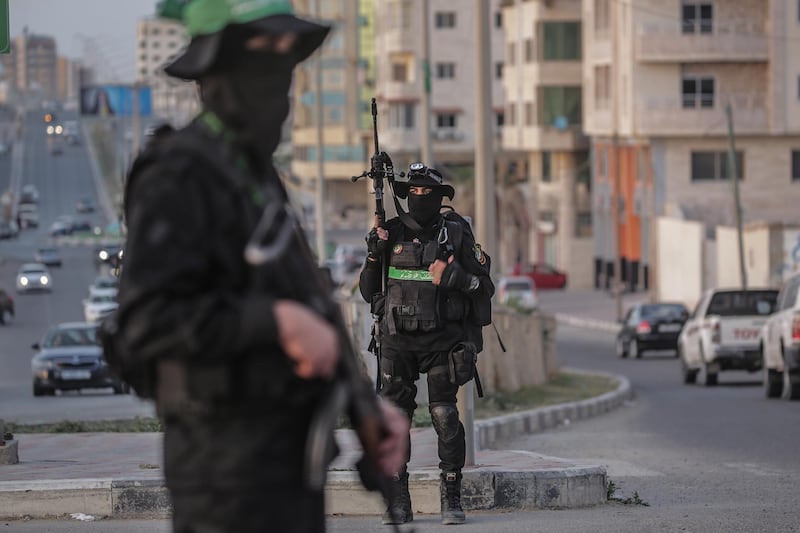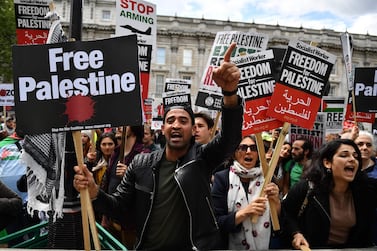The Palestinian Authority has accused Hamas of stealing lorry loads of cattle meat that Saudi Arabia gave to Gaza families for Ramadan.
The new Palestinian Prime Minister Mohammed Shtayyeh announced the charitable delivery of 25,000 offerings of cattle meat, estimated to weight at least 250,000 kilograms, from Saudi Arabia’s Islamic Bank of Development to Gaza last week.
The meat entered from the Egyptian-controlled Rafah border crossing, delivered by the Palestinian Red Crescent.
But after the meat successfully passed examinations by the Egyptian Food Safety department and the Gaza Ministry of Health, the goods did not reach their intended destination.
The Palestine Television network, controlled by the PA, accused the enclave’s rulers Hamas of hijacking the meat.
Dr Jamal Nazzal, a spokesman for the Palestine Liberation Organisation, wrote on Facebook that Hamas had stolen the meat to distribute it among its members, buy the support of non-Hamas beneficiaries and to sell at local markets to generate revenue.
“Hamas is stealing the sustenance of the poor,” Palestinian news agency Wafa said. “Everything sent to Gaza is hijacked by Hamas and sold in the black market to the benefit of the lords of [Palestinian] division and their families.”
Hamas and the PA remain at loggerheads after years of disputes. Hamas accuses the PA of squeezing the territory and worsening the situation for Palestinians, while the PA accuses Hamas of threatening its employees in Gaza and preventing its work there.
Local authorities denied the PA’s accusations and slammed the claims as incendiary.
"This is a poisonous slander campaign aimed to incite against Gaza and distort its image," Yassir Khalaf, spokesman for the Hamas-allied Palestinian Freedom Party, told The National.
“Hamas is a credible organisation. It’s widely trusted and more relevant and capable than the PA to deliver to the offerings to the poor in Gaza, where the PA doesn’t operate.”
Analysts in the enclave said that promised aid often did not reach the Gazan people.
"Every once in a while, we hear about another convoy of aid entering Gaza but we don't see any of it," Gazan analyst Ali Omer told The National.
“Most people believe the aid ends up in the hands of Hamas followers and supporters.”
“The problem is that Hamas’ hijacking some aid is usually used against us to urge defunding Palestinians and cutting humanitarian assistance.
"But this incident should instead highlight a need to create new inclusive mechanisms for aid distribution instead of further starving us.”
After the public outrage, the Hamas-controlled Ministry of Endowments on Monday announced that it was taking over distribution of the meat through its zakat commission.
It thanked Saudi King Salman and Crown Prince Mohammed bin Salman for their generous support.
“Aid reception and distribution should go through the proper and legitimate channels – in this case our ministry,” said Nour Weshah, an Endowment Ministry official.
“We already have credible lists of people in need that were put together over a long period of time and investigation to make sure that aid goes to the most deserving people.”
The ministry began distributing meat on Monday. But the controversy was further exacerbated after Hamas documented the distribution with a photo-shoot.
Many Gazans considered it to be humiliating and unethical, and said it exposed people in need.
“It was very humiliating," said Bahjaat, an unemployed Gazan beneficiary in his thirties.
"They kept yelling at poor people to stand in line and pose quietly, while cameras were taking pictures everywhere. It felt more like a job interview than a delivery of aid."
YA, 48, a Gazan mother and widow, said: “I felt so defeated. It was outrageous. Yesterday, they asked me to be present in front of the distribution point at 9am.
"My kids and I got so happy and excited, but after walking there for long distance while fasting, the door was slammed in my face and they asked me to come back later.
“I returned twice after and, when they were finally distributing the meat, the place was overcrowded and chaotic.
"They called the security on us and kicked us out because people made a commotion. They should respect our dignity instead of this humiliation."
Gaza activist Bassem Jumaa said: “They don’t see what’s really going on here, how the continued division and blockade turned us from freedom fighters to a city of beggars and aid dependants.
"The scenes of overcrowded aid distribution points should alarm the conscience of all Palestinian politicians, instead of being exploited for talking points against one another to perpetuate the status quo.”
The UN estimates that 80 per cent of Gaza’s population of two million rely on humanitarian assistance from international organisations.






